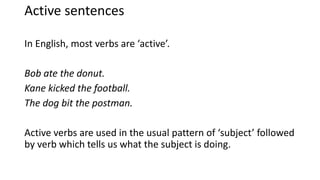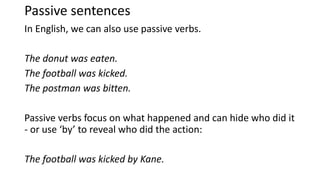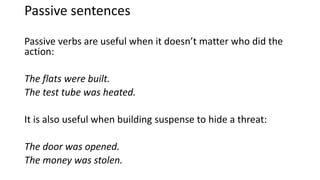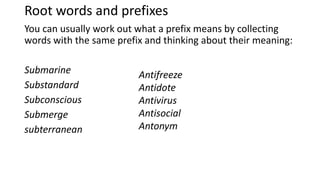The basics of sentences session 10pptx.pptx
- 1. The basics of sentences Active and passive: root words, suffixes and prefixes
- 2. Active sentences In English, most verbs are ‘active’. Bob ate the donut. Kane kicked the football. The dog bit the postman. Active verbs are used in the usual pattern of ‘subject’ followed by verb which tells us what the subject is doing.
- 3. Passive sentences In English, we can also use passive verbs. The donut was eaten. The football was kicked. The postman was bitten. Passive verbs focus on what happened and can hide who did it - or use ‘by’ to reveal who did the action: The football was kicked by Kane.
- 4. Passive sentences Passive verbs are useful when it doesn’t matter who did the action: The flats were built. The test tube was heated. It is also useful when building suspense to hide a threat: The door was opened. The money was stolen.
- 5. Root words and prefixes Prefixes are a group of letters that can be added to the start of a word to change its meaning. Kind – unkind In this case, the root word is ‘kind’. The prefix is ‘un’ and it changes the meaning. Happy – unhappy Fair – unfair Usual - unusual
- 6. Root words and prefixes You can usually work out what a prefix means by collecting words with the same prefix and thinking about their meaning: Unacceptable Unafraid Unadventurous Unaided Unaltered Unanswered Unbeatable Unavailable Unappreciated
- 7. Root words and prefixes You can usually work out what a prefix means by collecting words with the same prefix and thinking about their meaning: Submarine Substandard Subconscious Submerge subterranean Antifreeze Antidote Antivirus Antisocial Antonym
- 8. Root words and suffixes Suffixes are added to the end of a word to change its grammar. Quick – quickly Fast – faster Jump – jumped Happy – happiness Cook – cooking Wonder – wonderful Advert – advertise







